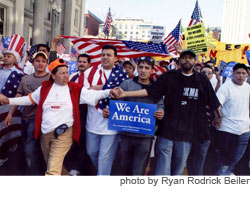 Without question the 2008 election is a historic time. Much has been said about the momentous nature of this presidential election. A woman, an African American, and a Latino were all trying to make history, albeit on one side of the political aisle. This moment in U.S. history should not be understated. As a Latino evangelical leader, I've been watching this election closely. It's an excellent time to talk about national voting in terms of a kaleidoscope. As a man who grew up in poor urban neighborhood in New Jersey and today pastors a multiethnic congregation in New York, I recognize the fragile nature of these conversations. Despite the complexity of this conversation, this election is an opportune moment to engage this much needed dialogue. The mixed legacy of race relations in the U.S. demands a broader conversation. In the 21st century, where many watch television in high-definition, national politics must be done in technicolor.
Without question the 2008 election is a historic time. Much has been said about the momentous nature of this presidential election. A woman, an African American, and a Latino were all trying to make history, albeit on one side of the political aisle. This moment in U.S. history should not be understated. As a Latino evangelical leader, I've been watching this election closely. It's an excellent time to talk about national voting in terms of a kaleidoscope. As a man who grew up in poor urban neighborhood in New Jersey and today pastors a multiethnic congregation in New York, I recognize the fragile nature of these conversations. Despite the complexity of this conversation, this election is an opportune moment to engage this much needed dialogue. The mixed legacy of race relations in the U.S. demands a broader conversation. In the 21st century, where many watch television in high-definition, national politics must be done in technicolor.
Everyone knows there is a Latino boom in the U.S. We are no longer, to paraphrase Black novelist, Ralph Ellison, The Invisible People. By most accounts, Latinos are the nation's fastest growing minority group. About 15 percent of the U.S. population-more than 45 million people-are of Hispanic descent. Although Hispanics are under 10 percent of the U.S. electorate, the Hispanic electorate looms large in several "swing states." According to a Pew Hispanic Center report, Hispanics make up 14 percent of the electorate in Florida, 12 percent in Nevada and Colorado, and 37 percent in New Mexico. There is no mystery to why both parties held Spanish-language debates on Univision. Latinos and Latinas matter.
This Latino(a) demographic boom is not bad news, nor as some might erroneously argue, an ominous sign of an invasion. Still, we cannot ignore the racism that still exists in many communities, Latinos included. Growing up in the "projects" I saw this happen too often. The urban plight often caused Blacks, poor Whites, and Latinos to struggle for resources. Regrettably, there is still a tendency by some in the media, politics, and culture to make the Latino population explosion a menacing sign. My response: scapegoating is not an option. It's time to change the channel to high-definition technicolor and create new solutions. Let's move into a sophisticated conversation that listens to all voices respectfully.
Any candidate that ignores the Latino evangelical electorates is making a serious mistake. Any leader, religious or political, that assumes how Latinos or evangelicals should vote by arguing that one party is the Christian or evangelical party is not speaking the language of the technicolor revival. There is a shift going on among evangelicals, and the more than 8 million Latino evangelicals cannot be easily politically pigeon-holed. Latino evangelicals are seeking an inclusive and broad coalition for social justice that values them at the table. Immigration, HIV/AIDS, issues concerning life, housing, healthcare, genocide, urban ecology, and education are all on their list of priorities. No candidate in 2008 can assume they know how Latino evangelicals will vote.
"Evangelical" and "Latino" need not equal Democrat, Republican, or Independent. This is about a movement that transcends the 2008 election - but will certainly influence it. We seek the beloved community, biblical justice, and the political genius that elevates the national conversation and transcends racial-ethnic divides and partisanship.

Rev. Gabriel Salguero is the pastor of the Lamb's Church of the Nazarene in New York City, a Ph.D. candidate at Union Theological Seminary, and the director of the Hispanic Leadership Program at Princeton Theological Seminary. He is also a Sojourners board member.
Got something to say about what you're reading? We value your feedback!